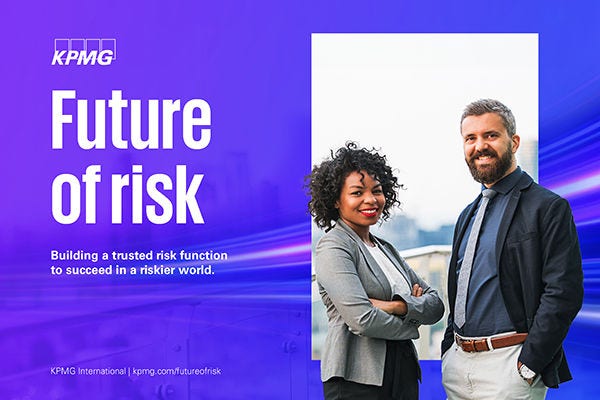Enterprises are facing an array of reputational, environmental, regulatory, and societal forces. To navigate this complex landscape, the C-suite should seek to embrace risk as an enabler of value and fundamentally transform their approach.
KPMG’s global survey of 400 executives reveals that their top priorities for the next few years are adapting to new risk types and adopting advanced analytics and AI. As organizations align risk management with strategic objectives, closer collaboration across the enterprise will be essential.
Key Themes and Statistics
Risk is the business of every member of the C-suite, and CROs should spread risk ownership across the organization, working with business leaders to build risk into their strategy and make it part of their everyday thinking.
61% of executives surveyed inside and outside the risk function expect to see a significant increase in the level of risk they will be responsible for in the next 3-5 years.
Key decisions by the risk function should begin and end by answering the question: how will this next step add value to the business?
Such an approach can help transform risk from the “department of ’no’” to a service that consistently creates value–inspiring everyone across the organization to incorporate risk into their everyday decision-making.
66% of CEOs and COOs and 57% of CROs and Risk Managers point to a need for cross-functional task forces, collaboration, and communication.
Decisions affecting one office or department can have a ripple effect on all the others, and this applies to risk, too. This means that risk management should be effectively embedded in decision-making throughout the organization, ideally as part of an “ERP for risk” system..
65% of C-suite executives — and 71% of CROs and Risk Managers — say that the integration of systems, domains, and processes can significantly enhance the effectiveness of risk-related decision-making.
New technology can help risk professionals to manage change better–although it also brings fresh risks like cybersecurity and AI bias. As organizations digitize and embrace AI, they should be seeking to gain trust in its application, preferable via fewer platforms that use common data.
98% of executives in our survey say digital acceleration has improved their organization's approach to risk, particularly in the fields of identification, monitoring and mitigation.
Investments in AI and gen AI call for a workforce with the skills to deploy these technologies. To do this, organizations should identify the impact of technology, upskill workers, and re-orient the operating model towards value.
45% of C-suite executives prioritize optimizing cybersecurity, while 36% of CROs and Risk Managers are focusing on improving IT risk management and integrating data analytics and predictive modeling.

Five steps towards transforming risk management
Our insights
Transforming for a future of value
The KPMG suite of business transformation solutions help clients get to a more productive and sustainable future. The solutions are designed to address different client challenges and different parts of a business or a operating model. Each one contains rich insights and is underpinned by our leading transformation methodology.
Empowering teams, enhancing performance
With integrated data and advanced analytics, KPMG Risk Hub, our GRC managed service, can help empower your leaders with AI enabled data insights for better risk-based decision-making, empowering frontline teams and building connectivity across your business. Explore KPMG Risk Hub, our cloud based GRC technology managed service for real-time risk management. Learn more


















